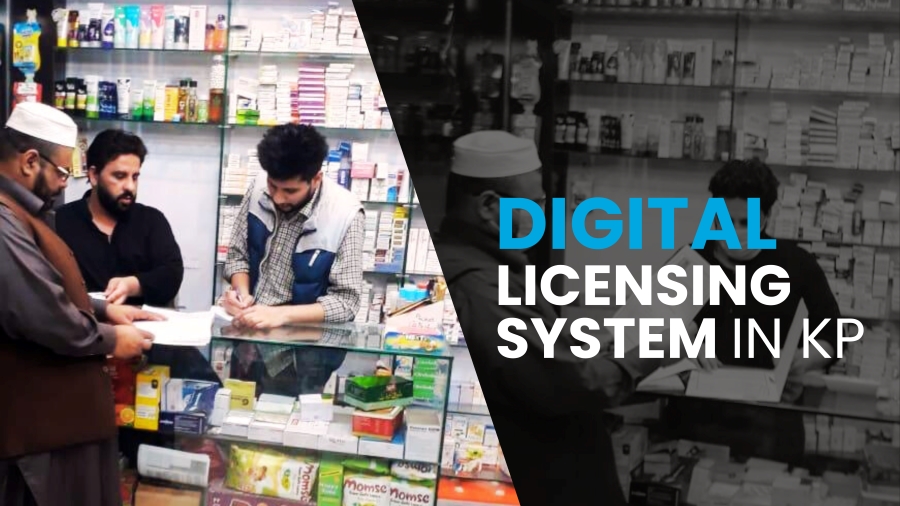
For years, Pakistan’s pharmaceutical sector operated with limited oversight, creating dangerous gaps in public health. In Khyber Pakhtunkhwa (KP), counterfeit and expired medicines flooded the market. Without a reliable licensing system, it was nearly impossible to verify which pharmacies were operating legally and which were selling unregulated drugs. The World Health Organization estimates that up to one million people die each year due to counterfeit medicines. In Pakistan, this issue became painfully clear when fake heart medication led to hundreds of deaths. But counterfeit drugs were only part of the problem — the system that allowed them to spread was broken.
Pharmacy licensing in KP was paper-based, inefficient, and difficult to enforce. Of the 12,000 registered pharmacies, 2,500 had regulatory violations, including a lack of refrigeration for essential medicines. In Peshawar alone, 600 pharmacy licenses were fraudulent. The process of obtaining a license could take up to two months, requiring multiple office visits and excessive paperwork. Health inspectors had no central system to track violations, making enforcement nearly impossible. Without proper oversight, unregulated pharmacies operated freely, putting millions of people at risk.
Previous attempts at reform failed because they focused on adding more inspections or increasing penalties without addressing the core issue: there was no way to systematically track and verify compliance. Pharmacy owners saw the system as a bureaucratic burden. Inspectors lacked the tools to enforce regulations. Citizens had no way to confirm if the medicines they were buying were safe. The licensing process itself had become an obstacle rather than a safeguard.
Building a Digital System That Works
To streamline pharmacy regulation, the 6th cohort of the KP Government Innovation Fellowship, run in partnership with the KP Information Technology Board (KPITB), collaborated with the KP Department of Health to develop a digital pharmacy licensing system.
Instead of working in isolation, our Fellows spent months engaging pharmacy inspectors, store owners, and public health officials to design a system that streamlined the licensing process while improving oversight.
A process that once took months now takes just 7–10 days. Over 15,000 pharmacy records—some dating back to 1971—have been digitized, enabling real-time verification of licensed pharmacies. On-site inspections are now mandatory before issuing or renewing any license, and automated renewal alerts prevent licenses from expiring unnoticed, ensuring stronger regulatory oversight.
Results That Strengthen Public Trust
Since its launch in 2021, the impact has been clear. Today, over 21,000 pharmacies in KP operate with verified licenses. Fraudulent pharmacies have been identified and shut down. Regulatory oversight has improved, making it harder for unlicensed pharmacies to continue operating unchecked. The shift to a digital process hasn’t just made compliance easier for pharmacies—it has strengthened public confidence in medicine safety. Citizens now have a way to verify pharmacy licenses before purchasing medicine, and regulators can track compliance in real time.
What This Means for Government Trust
This project reinforced key lessons about how government can improve public trust. When people see direct improvements in how services are delivered, their confidence in institutions increases. Research consistently shows that trust in government is shaped by local service delivery. People interact with government most often when they apply for a permit, receive healthcare, or access essential services. If these experiences are slow, inefficient, or opaque, trust erodes. But when processes are streamlined and responsive, people see government as competent and accountable.
Winning the 2024 DNDA Award recognizes the impact of this system, but there is more to be done. Expanding this model beyond KP to other provinces facing similar challenges could strengthen pharmaceutical oversight nationwide. Data analytics could help identify high-risk pharmacies before violations occur. Public-facing verification tools could allow citizens to check pharmacy licenses through a mobile app or SMS, further improving transparency.
The Path Forward
Trust in government is built through everyday interactions. When a pharmacy owner can get licensed in days instead of months, when inspectors can track violations in real time, and when citizens can verify that their medicines are safe, government works as it should. The KP pharmacy licensing system is an example of how targeted reforms can improve service delivery and strengthen public confidence in institutions. Better oversight doesn’t just make systems more efficient—it makes them more trustworthy.
Be Part of the Change
Effective governance depends on solutions that work for both institutions and the people they serve. The success of the KP pharmacy licensing system shows that with the right approach, public services can be more efficient, transparent, and citizen-focused.
We are always looking for technologists, policymakers, and civic innovators to help design and implement solutions that improve public service delivery. If you are interested in partnering, learning from this work, or applying for our next Fellowship cycle, get in touch at info@codeforpakistan.org